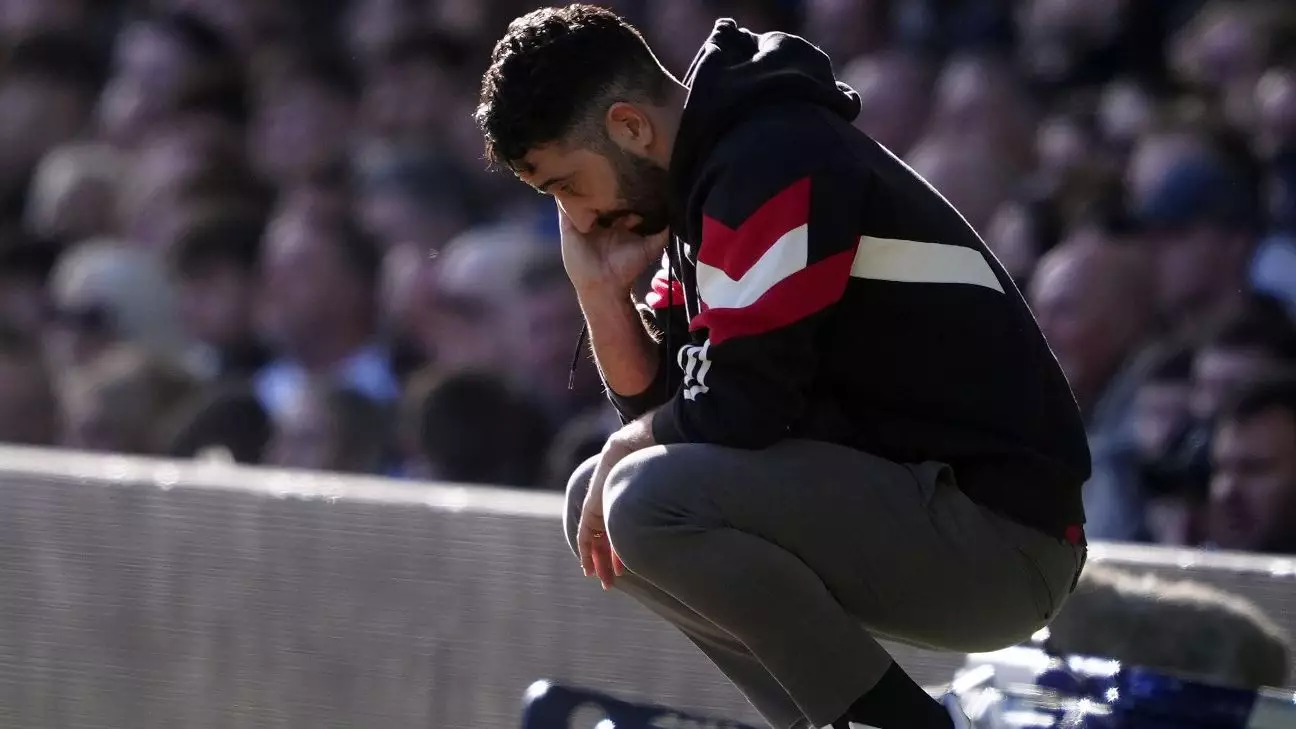In the high-stakes world of football management, the difference between success and failure can often be measured in mere moments. Ruben Amorim, the beleaguered coach of Manchester United, recently found himself at the center of a storm following a disheartening 2-0 defeat to West Ham. With the loss marking the club’s 17th in the Premier League this season, questions regarding Amorim’s future have erupted. Despite the turmoil, he remains resolute—claiming he will not resign, yet acknowledging that his tenure could be short-lived if the team’s performance does not improve.
Amorim’s stance reveals a paradox that many football managers face: an unwavering commitment to the club juxtaposed with the stark reality of results-driven expectations. While Amorim insists he is not contemplating quitting, his admission about potential dismissal underscores the ever-present pressure to win. Results speak volumes in football, and Amorim’s candid acknowledgment of this fact is a refreshing, albeit sobering, perspective in an age where many might deflect blame or evade accountability.
High Hopes and Harsh Realities
As Amorim prepares his team for critical matches against Chelsea in the Premier League and Tottenham in the Europa League final, he is not just attending to tactical adjustments but is also navigating the psychological impact of his team’s poor performances. Lifting the Europa League trophy would not only secure a place in the Champions League but also guarantee significant financial benefits, a lifeline for a club that has faced turbulent times both on and off the pitch.
However, the coach’s remarks regarding the demands of balancing both the Premier League and European competition reveal deeper concerns about squad depth and readiness. Amorim is alarmingly aware that a double burden could simply exacerbate the existing issues within the team, suggesting that perhaps Manchester United is not equipped to handle simultaneous competitions. He clearly sees that significant work needs to be done to bolster the squad and cultivate a culture of resilience and adaptability, which he believes is crucial for achieving success on multiple fronts.
The Stigma of Performance
The scrutiny faced by Amorim and his squad is expected, yet it seems to weigh heavier on the team given their recent history. Only six wins in 26 league games since his appointment is not just disappointing; it places immense pressure on him as he gears up for what could be a make-or-break summer. The staggering statistic illustrates a troubling trend, one that can erode fan trust and media support quickly. Fans desperately cling to hope while simultaneously battling skepticism; in this precarious environment, patience is a fleeting luxury.
Amorim’s assertion that next season’s expectations will require “perfection” is particularly telling. He recognizes the need for not just improvement, but for an elevated standard that transcends the current mediocrity. Such a sentiment reflects an understanding that many managers fail to grasp—one that acknowledges the severe implications of lackluster performances. The weight of expectation can drive a team to new heights or fracture their spirit under the relentless pursuit of unattainable perfection.
Building a New Legacy
United’s management appears willing to stand by Amorim, even amidst a rocky path ahead marked by uncertainty and ample challenges. This loyalty could be a double-edged sword; while stability is critical in a managerial role, the inability to produce results quickly can accelerate the disillusionment among players and supporters alike. If Amorim and his team are to forge a new path for Manchester United, a blend of tactical innovation, effective communication, and squad cohesion will be indispensable.
What lies ahead for Amorim at Manchester United is fraught with potential. The path is laden with hurdles, yet underscored by a unique opportunity to reshape a club long steeped in tradition. Balancing ambition with reality will be key as Amorim strives to lift his players and mobilize the fanbase, allowing them all to envision the return to glory. The only certainty in football is uncertainty, and it is how Amorim navigates this turbulence that will ultimately determine whether he can emerge as a cherished figure within the storied legacy of Manchester United.

